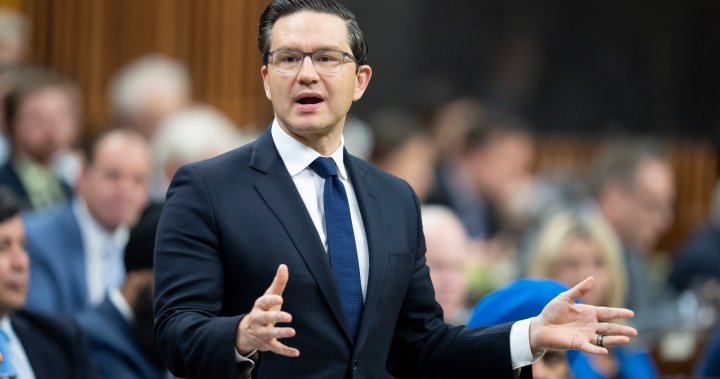Want to discuss? Please read our Commenting Policy first.
Senior federal bureaucrats examined whether cryptocurrencies protect against inflation not long after Opposition Leader Pierre Poilievre made the claim as a candidate in the Conservative leadership race, according to an internal government document.
The Privy Council Office, whose role is to provide non-partisan advice to the prime minister and cabinet, prepared a briefing note on the viability of digital currencies for the head of the public service weeks after Poilievre’s comments in late March.
The briefing note, obtained by The Canadian Press through an access-to-information request, says that “in light of inflationary pressures, some proponents have touted the ability of cryptoassets like bitcoin and ethereum to ‘decentralize’ the Canadian economy, providing a substitute for the national currency.”
But cryptocurrencies haven’t provided protection against inflation and serve as poor substitutes to the Canadian dollar for day-to-day transactions, says the document, which was delivered to the clerk of the Privy Council at the beginning of May.
Read more: Cryptocurrencies not a way to ‘opt out of inflation’: Bank of Canada official
“Cryptoassets have also not hedged against inflation, with most usage being speculative and with price behaviour consistent with that of risky assets.”
A spokesperson for the Privy Council Office said the briefing note was prepared to provide the clerk with background information on cryptoassets, “including information on whether they have offered protection against inflation.”
In late March, Poilievre had suggested during a campaign event that digital currencies could help Canadians “opt out of inflation” because they are not influenced by central banks.
Speaking at a shawarma shop in London, Ont., that accepts bitcoin as payment, Poilievre promised to make the country friendlier to cryptocurrencies.
But over the summer, bitcoin’s value plummeted, and it has lost more than half its value compared to the beginning of the year — a fate similar to that of other digital currencies.
The briefing note also looked at whether monetary stimulus is primarily responsible for high inflation and rising prices of goods and services, a claim it says is advocated by “crypto asset proponents.”
Monetary stimulus is “only one factor among many that have contributed to the current bout of higher inflation,” the document says. Other factors include pandemic-related supply-chain problems and Russia’s invasion of Ukraine.
The document says that stimulus from the Bank of Canada helped speed the country’s economic recovery.
Poilievre has been a loud critic of the central bank and a proponent of the view that the stimulus caused higher inflation. He promised during the leadership campaign that if he is elected prime minister, he will fire the bank’s governor, Tiff Macklem.
Since becoming leader on Sept. 10, Poilievre has said little on the topic of cryptocurrencies. His office did not immediately respond to a request for comment on Wednesday.
Conservative MP Michelle Rempel Garner was expected to introduce a private member’s bill to develop a plan to grow cryptocurrencies on the first day the House of Commons resumed, but the bill was delayed.
In a statement, Rempel Garner’s assistant said scheduling conflicts meant MPs agreed to move around debate time for three private members’ bills.
Liberals have seized upon Poilievre’s support of cryptocurrency as an attack line on social media and in the House of Commons since its return from a summer break.
“Telling people that they can opt out of inflation by investing their savings in volatile cryptocurrencies is not responsible leadership,” Prime Minister Justin Trudeau said earlier this month. “By the way, anyone who followed that advice would have seen their life savings destroyed.”
Read more: Poilievre overtakes Trudeau as leader seen as best choice for prime minister: poll
The Privy Council briefing note says that while cryptocurrencies have become more popular, “there is no clear expectation” among regulators, central banks, and the financial sector that cryptocurrencies will be adopted in the mainstream as a substitute to traditional currencies.
If cryptocurrencies were to stabilize and be adopted more widely, monetary policy could become less effective, leading to more-prolonged economic downturns, it says.
Sen. Tony Dean, who formerly headed the Ontario public service, said it’s routine for public servants to prepare briefing notes on a range of issues, and these are sometimes prepared proactively, without a request from the top.
“It’s then available in the event that that issue or that opportunity becomes of interest (to) the government,” Dean said.
Dean said Poilievre’s “significant” and “unusual” comments could have prompted the public service to look into cryptocurrency.
“I’m not surprised that a note would be generated on an issue like that,” he said. “It’s kind of novel. It’s controversial. It’s made by one of the contenders in a campaign, and that person may get to actually talk about it some more and actualize it.”
A weekly newsletter to tackle your biggest money questions
A weekly newsletter to tackle your biggest money questions
Author
Administraroot

